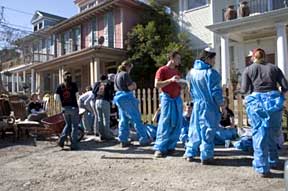Cleaning up in New Orleans, archiving in Vermont and mapping Panama: How Cornell students spent their winter break
By Daniel Aloi

Cornell students in City & Regional Planning (CRP), Historic Preservation and Planning (HPP) and landscape architecture had a busy winter break in January. They participated in group study projects including cleaning out flooded houses in New Orleans, archiving local political history in Vermont and studying sustainable development along the Panama Canal.
Three of the participants, all CRP graduate teaching and research specialists, reported on their projects in Sibley Hall on Feb. 7, in presentations focused on planning, development and preservation issues.
Rebuilding New Orleans
Eighteen students and four faculty went to New Orleans from Jan. 3-17 to provide brawn and brains, cleaning up neighborhoods severely flooded by Hurricane Katrina in August and assisting in redevelopment efforts.
"The area is not what you'd expect it to be after four months," said CRP graduate student Renee Kinchla, showing photos of streets still piled high with debris and overturned cars. "It's pretty amazing how little work you see being done throughout the city."
While taking a fall course on the history, evolution and current condition of the 9th Ward, students raised $13,000 to travel and participate in rebuilding efforts led by the Association of Community Organizations for Reform Now (ACORN), one of the oldest community associations in the United States, representing 9,000 residents and four African-American neighborhoods in New Orleans, including the 7th and 9th wards. The Cornell group worked in, among others, the Lower 9th, St. Claude, Lakeside and New Orleans East.
"They're not really in the rebuilding/human resource/workforce training business, but because that's what people need, that's what they're trying to do," said Kenneth Reardon, CRP department chair and associate professor who also participated in ACORN's Community Forum on Rebuilding New Orleans, held in November in Baton Rouge.
The group cleaned out 14 houses and one church, removing their contents, taking sledgehammers to interior walls and treating mold in dwellings slated for rehabitation.
While ACORN is committed to rebuilding its neighborhoods, "many residents have no services to come back to," Reardon said. Also, a Rand Corp. survey determined that only about half of the damaged buildings might be salvaged, and other property would be returned to wetlands. One plan is "to build a more compact 9th Ward on the higher elevated areas," he said.
"We had people tell us 'this neighborhood never flooded before,' and now it's slated for demolition. You can get a sense of how betrayed people feel."
A group of 22 students and three professors returned for a research trip Feb. 22-26 and made a presentation to ACORN; and a joint CRP-HPP work party will focus on the city's St. Roch Market over spring break later in March.

Nearly 100 undergraduate and graduate students are participating in a series of CRP workshop classes this spring, working together to prepare a comprehensive redevelopment plan for the Upper 9th Ward, Reardon said. Flood-damaged neighborhoods seeking government support need to file their redevelopment plans by June 20.
This summer, eight CRP summer interns will help community-based organizations with recovery efforts in New Orleans, in cooperation with ACORN, Louisiana State University, the University of Pennsylvania and the University of Illinois.
Politics in Burlington
Crystal Lackey discussed a recent weeklong archive project by six graduate students of Professor of City and Regional Planning Pierre Clavel, documenting 25 years of progressive politics in Burlington, Vt., starting with the election of Mayor Bernie Sanders in 1981 -- "this Socialist icon who'd stepped into power at the same time as Reagan," Lackey said. (Sanders has represented Vermont as an Independent in the U.S. House of Representatives since 1991, and is running for the U.S. Senate in 2006.)
The Burlington project involved oral history interviews and gathering such key documentation as newspaper clippings, photographs and handbills. The group also toured the Lake Champlain waterfront development, the Burlington Community Land Trust (which oversees 850 units of affordable housing) and an economic redevelopment initiative in Burlington's low-income Old North End.
Other examples of progressive organizations the group documented include Burlington Electric Co., a publicly owned utility with a woodchip-to-electric power generation plant; Local Motion, a bicycle and pedestrian advocacy group, and Burlington Telecom, a city-owned telephone, broadband internet and cable television provider.
The city's progressive era may be ending soon, Lackey said, because Mayor Peter Clavelle, part of the Progressive Coalition since the early '80s, is not seeking reelection.
Sustainable Panama
Matthew Johnston reported on Cornell's first Sustainable Panama Workshop, a four-credit field-learning course held Jan. 1-21 with Professor of Landscape Architecture Roger Trancik. The workshop mapped long-term development and environmental conservation strategies for the Panama Canal region, with 13 graduate and undergraduate students surveying the effects of urbanization and development.
"Panama is in the business of moving ships, and as a result, the canal region is faced with ever-evolving economic and social pressures," Johnston said.
The group learned about the region's history and current challenges and met with officials of a community-development organization concerned with affordable housing and raising money for preservation efforts in Panama City. Project support was provided by several institutions, including the United Nations Educational, Scientific and Cultural Organization (UNESCO).
The workshop participants will produce a study and a series of planning documents on the development of the watershed, Johnston said. Documentation of the project will be posted online.
Media Contact
Get Cornell news delivered right to your inbox.
Subscribe